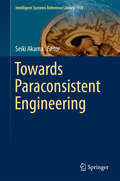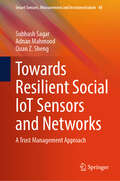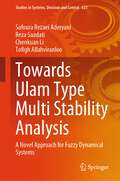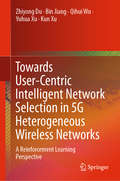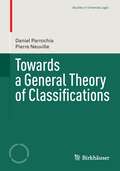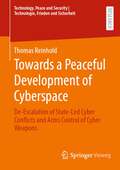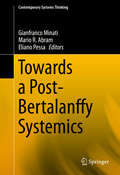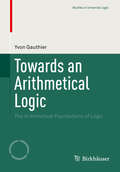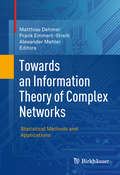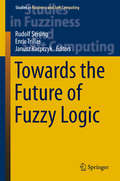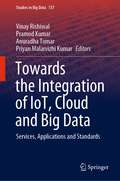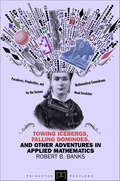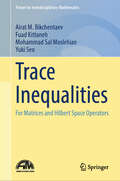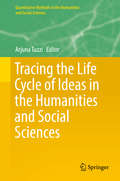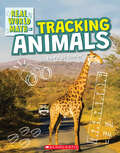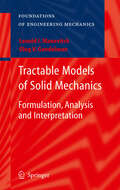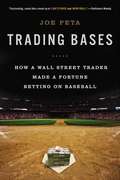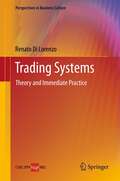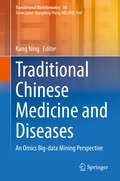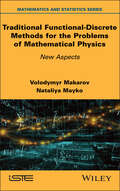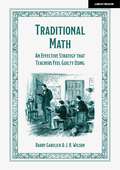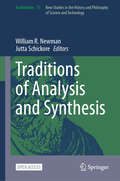- Table View
- List View
Towards Paraconsistent Engineering
by Seiki AkamaThis book presents a collection of contributions from related logics to applied paraconsistency. Moreover, all of them are dedicated to Jair Minoro Abe,on the occasion of his sixtieth birthday. He is one of the experts in Paraconsistent Engineering, who developed the so-called annotated logics. The book includes important contributions on foundations and applications of paraconsistent logics in connection with engineering, mathematical logic, philosophical logic, computer science, physics, economics, and biology. It will be of interest to students and researchers, who are working on engineering and logic.
Towards Resilient Social IoT Sensors and Networks: A Trust Management Approach (Smart Sensors, Measurement and Instrumentation #48)
by Quan Z. Sheng Adnan Mahmood Subhash SagarThis book, at first, explores the evolution of the IoT to SIoT and offers a comprehensive understanding of SIoT and trust management vis-à-vis SIoT. It subsequently envisages trust quantification models by employing key SIoT-specific trust features, including SIoT relationships (e.g., friendships, working relationships, and community-of-interest), direct observations, and indirect observations, to augment the idea of trust quantification of a SIoT object. Furthermore, diverse trust aggregation techniques, i.e., conventional weighted sum, machine learning, and artificial neural networks, are proposed so as to address the challenges of the trust aggregation. Finally, the book outlines the future research directions for emphasizing the importance of trustworthiness management in the evolving notion of the SIoT.
Towards Ulam Type Multi Stability Analysis: A Novel Approach for Fuzzy Dynamical Systems (Studies in Systems, Decision and Control #523)
by Reza Saadati Tofigh Allahviranloo Safoura Rezaei Aderyani Chenkuan LiThe main target of this book is to present a new concept of Ulam-type stability, i.e., multi-stability, through the classical, well-known special functions and to obtain the best approximation error estimates by a different concept of perturbation stability including fuzzy approaches for uncertainty considerations. This stability allows us to obtain diverse approximations depending on various special functions that are initially chosen and to evaluate maximal stability and minimal error which enable us to obtain a unique optimal solution of functional equations, inequalities, and fractional equations. Stability analysis in the sense of the Ulam and its different kinds has received considerable attention from the researchers. However, how to effectively generalize the Ulam stability problems and to evaluate optimized controllability and stability are new issues. The multi-stability not only covers the previous concepts but also considers the optimization of the problem and provides a comprehensive discussion of optimizing the different types of the Ulam stabilities of mathematical models used in the natural sciences and engineering disciplines with fuzzy attitudes. Besides, this book also deals with nonlinear differential equations with various boundary conditions or initial value problems, based on the matrix Mittag-Leffler function, fixed point theory, as well as Babenko's approach to study uniqueness and existence of solutions. In general, the benefits for the readers can be concluded as follows: 1. Evaluates maximal stability with minimal error to get a unique optimal solution. 2. Discusses an optimal method of the alternative to study existence, uniqueness, and different types of Ulam stabilities under special consideration of the fuzzy approaches. 3. Delves into the new study of boundary value problems of fractional integro-differential equations with integral boundary conditions and variable coefficients.
Towards User-Centric Intelligent Network Selection in 5G Heterogeneous Wireless Networks: A Reinforcement Learning Perspective
by Yuhua Xu Bin Jiang Zhiyong Du Qihui Wu Kun XuThis book presents reinforcement learning (RL) based solutions for user-centric online network selection optimization. The main content can be divided into three parts. The first part (chapter 2 and 3) focuses on how to learning the best network when QoE is revealed beyond QoS under the framework of multi-armed bandit (MAB). The second part (chapter 4 and 5) focuses on how to meet dynamic user demand in complex and uncertain heterogeneous wireless networks under the framework of markov decision process (MDP). The third part (chapter 6 and 7) focuses on how to meet heterogeneous user demand for multiple users inlarge-scale networks under the framework of game theory. Efficient RL algorithms with practical constraints and considerations are proposed to optimize QoE for realizing intelligent online network selection for future mobile networks. This book is intended as a reference resource for researchers and designers in resource management of 5G networks and beyond.
Towards a General Theory of Classifications
by Daniel Parrochia Pierre NeuvilleThis book is an essay on the epistemology of classifications. Its main purpose is not to provide an exposition of an actual mathematical theory of classifications, that is, a general theory which would be available to any kind of them: hierarchical or non-hierarchical, ordinary or fuzzy, overlapping or non-overlapping, finite or infinite, and so on, establishing a basis for all possible divisions of the real world. For the moment, such a theory remains nothing but a dream. Instead, the authors essentially put forward a number of key questions. Their aim is rather to reveal the "state of art" of this dynamic field and the philosophy one may eventually adopt to go further. To this end they present some advances made in the course of the last century, discuss a few tricky problems that remain to be solved, and show the avenues open to those who no longer wish to stay on the wrong track. Researchers and professionals interested in the epistemology and philosophy of science, library science, logic and set theory, order theory or cluster analysis will find this book a comprehensive, original and progressive introduction to the main questions in this field.
Towards a Peaceful Development of Cyberspace: De-Escalation of State-Led Cyber Conflicts and Arms Control of Cyber Weapons (Technology, Peace and Security I Technologie, Frieden und Sicherheit)
by Thomas ReinholdThe cyberspace and its global infrastructures are essential for our civilizations, the economy and administration. However, cyberspace is also increasingly developing into an intelligence and military operational area, visible in the creation of military cyber departments and the integration of cyberspace into states' security and defense strategies. Unfortunately, many of the established toolset of transparency, de-escalation and arms control measures do not work for cyberspace due to its specific technical characteristics. But how de-escalation of state-led conflicts in cyberspace can be achieved and how arms control of cyber weapons can be developed? Based on a technical perspective with regard to the underlying political challenges, the book follows an approach of adopting already existing technical measures from other fields of the computer science. It presents a classification system for cyberweapons, an approach for the mutual reduction of vulnerability stockpiles and provides an approach to prove the non-involvement in a cyber conflict. Beyond this, it aims to provide some impulses regarding the responsibility and creative options of the computer science with a view to the peaceful development and use of cyberspace.
Towards a Post-Bertalanffy Systemics
by Gianfranco Minati Mario R. Abram Eliano PessaThis book contains the proceedings of the Sixth National Conference of the Italian Systems Society. The title, Towards a post-Bertalanffy Systemics, aims to underline the need for Systemics and Systems Science to generalize theoretically concepts related to complexity (the great enemy of Bertalanffy Systemics). Hopefully this goal should be achieved by working in an inter-disciplinary and trans-disciplinary fashion, using systemic concepts arising from various disciplines and from the original, or Bertalanffy Systemics, as well. The interdisciplinary nature of the original Systemics and its power of generalization were given, overall, by the fact that the problems and solutions of one discipline become problems and solutions for another. Today, the modeling and interpretation of multidisciplinary approaches and representations makes easier to recognize these interconnections. The context, however, has changed dramatically. Of course, the challenge is still to find theoretical generalizations and applications, even where we have a lot of specificities, but we know very little on how to combine them. We cannot, however, simply replace the old with the new, but we must introduce strategies to recognize, represent, model and act on new levels, combining multiple representations, functions and emergence. In many disciplines this has been already done, and inevitably well, since targets and projects are well specified and oriented. The challenge is to do it for Systemics, with the vocations of cultural and theoretical generalization. Examples of new issues introduced by such theoretical disciplinary improvements, dealt with by many disciplines, include the study of mesoscopic or middle-way level, of multiple and dynamic coherence, of equivalence/non-equivalence, of fractality, of networks, of non-causality, of non-invasiveness, of non-prescribability, of non-separability, of quasi properties, of symmetry properties, of topological dynamics, as well as of quantum theories and concepts. The conference was devoted to identifying, discussing and understanding possible interrelationships of theoretical disciplinary improvements, recognized as having prospective fundamental roles for a new post-Bertalanffy Systemics. The latter should be able to deal with problems related to complexity in a generalized way. In this context the inter-disciplinarity should consists, for instance, in a disciplinary reformulation of problems, as from algebraic to geometrical, from military to political, from biological to chemical, while the trans-disciplinarity should be related to the study of such reformulations and their properties. The Italian Systems Society (AIRS) was founded in the 1996. The AIRS is a network of academicians, scientists, researchers and professionals involved in Systemics. A partial list of disciplines represented is: Architecture Biology Economics Education Engineering Mathematics Neurosciences Medicine Music Philosophy Psychology Physics. Previous conferences had as open lecturers professors Arecchi, Haken, Klir, and Kauffman. The proceedings have been published as: 1. Minati, G. , (ed. ), (1998), Proceedings of the first Italian Conference on Systemics, Apogeo Scientifica, Milan, Italy. 2. Minati, G. , and Pessa, E. , (eds. ) (2002), Emergence in Complex Cognitive, Social and Biological Systems. Kluwer, New York. 3. Minati, G. , Pessa, E. , and Abram, M. , (eds. ), (2006), Systemics of Emergence: Research and Applications. Springer, New York. 4. Minati, G. , Abram, M. and Pessa, E. , (eds. ), (2009), Processes of emergence of systems and systemic properties. Towards a general theory of emergence. World Scientific, Singapore. 5. Minati, G. , Abram, M. and Pessa, E. , (eds. ), (2012), Methods, Models, simulations and approaches - towards a general theory of change. World Scientific, Singapore.
Towards an Arithmetical Logic
by Yvon GauthierThis book offers an original contribution to the foundations of logic and mathematics and focuses on the internal logic of mathematical theories, from arithmetic or number theory to algebraic geometry. Arithmetical logic is the term used to refer to the internal logic of classical arithmetic, here called Fermat-Kronecker arithmetic and combines Fermat's method of infinite descent with Kronecker's general arithmetic of homogeneous polynomials. The book also includes a treatment of theories in physics and mathematical physics to underscore the role of arithmetic from a constructivist viewpoint. The scope of the work intertwines historical, mathematical, logical and philosophical dimensions in a unified critical perspective; as such, it will appeal to a broad readership from mathematicians to logicians, to philosophers interested in foundational questions. Researchers and graduate students in the fields of philosophy and mathematics will benefit from the author's critical approach to the foundations of logic and mathematics.
Towards an Information Theory of Complex Networks: Statistical Methods and Applications
by Alexander Mehler Matthias Dehmer Frank Emmert-StreibFor over a decade, complex networks have steadily grown as an important tool across a broad array of academic disciplines, with applications ranging from physics to social media. A tightly organized collection of carefully-selected papers on the subject, Towards an Information Theory of Complex Networks: Statistical Methods and Applications presents theoretical and practical results about information-theoretic and statistical models of complex networks in the natural sciences and humanities. The book's major goal is to advocate and promote a combination of graph-theoretic, information-theoretic, and statistical methods as a way to better understand and characterize real-world networks. This volume is the first to present a self-contained, comprehensive overview of information-theoretic models of complex networks with an emphasis on applications. As such, it marks a first step toward establishing advanced statistical information theory as a unified theoretical basis of complex networks for all scientific disciplines and can serve as a valuable resource for a diverse audience of advanced students and professional scientists. While it is primarily intended as a reference for research, the book could also be a useful supplemental graduate text in courses related to information science, graph theory, machine learning, and computational biology, among others.
Towards the Future of Fuzzy Logic
by Janusz Kacprzyk Rudolf Seising Enric TrillasThis book provides readers with a snapshot of the state-of-the art in fuzzy logic. Throughout the chapters, key theories developed in the last fifty years as well as important applications to practical problems are presented and discussed from different perspectives, as the authors hail from different disciplines and therefore use fuzzy logic for different purposes. The book aims at showing how fuzzy logic has evolved since the first theory formulation by Lotfi A. Zadeh in his seminal paper on Fuzzy Sets in 1965. Fuzzy theories and implementation grew at an impressive speed and achieved significant results, especially on the applicative side. The study of fuzzy logic and its practice spread all over the world, from Europe to Asia, America and Oceania. The editors believe that, thanks to the drive of young researchers, fuzzy logic will be able to face the challenging goals posed by computing with words. New frontiers of knowledge are waiting to be explored. In order to motivate young people to engage in the future development of fuzzy logic, fuzzy methodologies, fuzzy applications, etc. , the editors invited a team of internationally respected experts to write the present collection of papers, which shows the present and future potentials of fuzzy logic from different disciplinary perspectives and personal standpoints.
Towards the Integration of IoT, Cloud and Big Data: Services, Applications and Standards (Studies in Big Data #137)
by Pramod Kumar Anuradha Tomar Vinay Rishiwal Priyan Malarvizhi KumarThis book discusses integration of internet of things (IoT), cloud computing, and big data. It presents a unique platform where IoT, cloud computing, and big data are fused together and can be foreseen as a perfect solution to many applications. Usually, IoT, cloud computing, and big data are researched separately on the basis of their properties, underlying technologies, and other open issues. Integration of IoT, cloud computing and big data is not that easy and can face key open issues like standardization of interfaces, power and energy efficiency in both data processing and transmission, security and privacy, storage mechanisms for future applications, scalability and flexibility, and QoS provisioning for end user applications. Integration of IoT, cloud computing, and big data represents the next big rise for future industry and business applications. This integration opens new exhilarating directions for research and it is discussed in this book.
Towing Icebergs, Falling Dominoes, and Other Adventures in Applied Mathematics (Princeton Puzzlers)
by Robert B. BanksAlthough we seldom think of it, our lives are played out in a world of numbers. Such common activities as throwing baseballs, skipping rope, growing flowers, playing football, measuring savings accounts, and many others are inherently mathematical. So are more speculative problems that are simply fun to ponder in themselves--such as the best way to score Olympic events. Here Robert Banks presents a wide range of musings, both practical and entertaining, that have intrigued him and others: How tall can one grow? Why do we get stuck in traffic? Which football player would have a better chance of breaking away--a small, speedy wide receiver or a huge, slow linebacker? Can California water shortages be alleviated by towing icebergs from Antarctica? What is the fastest the 100-meter dash will ever be run? The book's twenty-four concise chapters, each centered on a real-world phenomenon, are presented in an informal and engaging manner. Banks shows how math and simple reasoning together may produce elegant models that explain everything from the federal debt to the proper technique for ski-jumping. This book, which requires of its readers only a basic understanding of high school or college math, is for anyone fascinated by the workings of mathematics in our everyday lives, as well as its applications to what may be imagined. All will be rewarded with a myriad of interesting problems and the know-how to solve them.Some images inside the book are unavailable due to digital copyright restrictions.
Trace Inequalities: For Matrices and Hilbert Space Operators (Forum for Interdisciplinary Mathematics)
by Mohammad Sal Moslehian Airat M. Bikchentaev Fuad Kittaneh Yuki SeoThis book is a comprehensive and advanced exploration of trace inequalities in the context of matrices and operators acting on Hilbert spaces. Its goal is to present elegant inequalities with innovative proofs. Instead of presenting generalized versions that can be complicated and lack clarity, the book focuses on beautiful and original inequalities. Divided into eight chapters, this book is designed for researchers and graduate students in mathematics, physics, and engineering. It provides detailed explanations for most of the results and includes a variety of exercises and problems to help readers understand the content and inspire further research into advanced topics.
Tracing the Life Cycle of Ideas in the Humanities and Social Sciences: A Portrait Of A Discipline Through Analyses Of Scientific Literature (Quantitative Methods in the Humanities and Social Sciences)
by Arjuna TuzziThis book demonstrates how quantitative methods for text analysis can successfully combine with qualitative methods in the study of different disciplines of the Humanities and Social Sciences (HSS). The book focuses on learning about the evolution of ideas of HSS disciplines through a distant reading of the contents conveyed by scientific literature, in order to retrieve the most relevant topics being debated over time. Quantitative methods, statistical techniques and software packages are used to identify and study the main subject matters of a discipline from raw textual data, both in the past and today. The book also deals with the concept of quality of life of words and aims to foster a discussion about the life cycle of scientific ideas. Textual data retrieved from large corpora pose interesting challenges for any data analysis method and today represent a growing area of research in many fields. New problems emerge from the growing availability of large databases and new methods are needed to retrieve significant information from those large information sources. This book can be used to explain how quantitative methods can be part of the research instrumentation and the "toolbox" of scholars of Humanities and Social Sciences. The book contains numerous examples and a description of the main methods in use, with references to literature and available software. Most of the chapters of the book have been written in a non-technical language for HSS researchers without mathematical, computer or statistical backgrounds.
Tracking Animals (Real World Math Ser.)
by Paige TowlerFollow the paw prints and get ready to use math to track animals!1 paw print … 2 paw prints … 3! Scientists use math every day to track animals. Join a real animal tracker to COUNT in the rainforest, ADD animals on the savanna, MEASURE in the ocean, and more. Then test your math skills with special You Can Do It challenges.This brand-new series demonstrates how math skills can be applied to high-interest topics and careers in Coding, Building, Tracking Animals, and Space Exploration. The K-2 math concepts include counting 1-100 with basic addition and subtraction, using the power of 10, measuring, and simple geometry. Real world scientists, architects, programmers, and mathematicians model hands-on, from-the-field experiences in a way that will make children excited to use and expand their math skills!
Tractability
by Lucas Bordeaux Youssef Hamadi Pushmeet KohliClassical computer science textbooks tell us that some problems are 'hard'. Yet many areas, from machine learning and computer vision, to theorem proving and software verification, have defined their own set of tools for effectively solving complex problems. Tractability provides an overview of these different techniques, and of the fundamental concepts and properties used to tame intractability. This book will help you understand what to do when facing a hard computational problem. Can the problem be modelled by convex, or submodular functions? Will the instances arising in practice be of low treewidth, or exhibit another specific graph structure that makes them easy? Is it acceptable to use scalable, but approximate algorithms? A wide range of approaches is presented through self-contained chapters written by authoritative researchers on each topic. As a reference on a core problem in computer science, this book will appeal to theoreticians and practitioners alike.
Tractable Models of Solid Mechanics
by Oleg V. Gendelman Leonid I. ManevitchThis book describes significant tractable models used in solid mechanics - classical models used in modern mechanics as well as new ones. The models are selected to illustrate the main ideas which allow scientists to describe complicated effects in a simple manner and to clarify basic notations of solid mechanics. A model is considered to be tractable if it is based on clear physical assumptions which allow the selection of significant effects and relatively simple mathematical formulations. The first part of the book briefly reviews classical tractable models for a simple description of complex effects developed from the 18th to the 20th century and widely used in modern mechanics. The second part describes systematically the new tractable models used today for the treatment of increasingly complex mechanical objects - from systems with two degrees of freedom to three-dimensional continuous objects.
Trading Bases
by Joe PetaAn ex-Wall Street trader improved on Moneyball's famed sabermetrics and beat the Vegas odds with his own betting methods. Here is the story of how Joe Peta turned fantasy baseball into a dream come true. Joe Peta turned his back on his Wall Street trading career to pursue an ingenious--and incredibly risky--dream. He would apply his risk-analysis skills to Major League Baseball, and treat the sport like the S&P 500. In Trading Bases, Peta takes us on his journey from the ballpark in San Francisco to the trading floors and baseball bars of New York and the sportsbooks of Las Vegas, telling the story of how he created a baseball "hedge fund" with an astounding 41 percent return in his first year. And he explains the unique methods he developed. Along the way, Peta provides insight into the Wall Street crisis he managed to escape: the fragility of the midnineties investment model; the disgraced former CEO of Lehman Brothers, who recruited Peta; and the high-adrenaline atmosphere where million-dollar sports-betting pools were common.
Trading Bases
by Joe PetaAn ex-Wall Street trader improved on Moneyball's famed sabermetrics and beat the Vegas odds with his own betting methods. Here is the story of how Joe Peta turned fantasy baseball into a dream come true. Joe Peta turned his back on his Wall Street trading career to pursue an ingenious--and incredibly risky--dream. He would apply his risk-analysis skills to Major League Baseball, and treat the sport like the S&P 500. In Trading Bases, Peta takes us on his journey from the ballpark in San Francisco to the trading floors and baseball bars of New York and the sportsbooks of Las Vegas, telling the story of how he created a baseball "hedge fund" with an astounding 41 percent return in his first year. And he explains the unique methods he developed. Along the way, Peta provides insight into the Wall Street crisis he managed to escape: the fragility of the midnineties investment model; the disgraced former CEO of Lehman Brothers, who recruited Peta; and the high-adrenaline atmosphere where million-dollar sports-betting pools were common.
Trading Systems
by Renato Di LorenzoFor years, systems theory has been applied successfully in all fields of technology, but its impact on the world of finance has to date been limited. This book aims to rectify this situation. Readers will no longer be able to assert that money cannot be reliably earned on the financial markets: one might just as well say that man has never set foot on the moon. The potential reader may be frightened by the number of formulas, but can be reassured that almost all of them can be skipped. What makes the miracle of guaranteed trading success possible are the worksheets and the codes for Internet platforms which provide (at a click) functions that once had to be built with great difficulty. These worksheets and codes will be sent free of charge to anyone who requests them from the author (renato.dilorenzo1@gmail.com) as long as the request is accompanied by proof of purchase of the book, such as a photograph of the receipt taken on a mobile phone.
Traditional Chinese Medicine and Diseases: An Omics Big-data Mining Perspective (Translational Bioinformatics #18)
by Kang NingThis book focuses on the multi-omics big-data integration, the data-mining techniques and the cutting-edge omics researches in principles and applications for a deep understanding of Traditional Chinese Medicine (TCM) and diseases from the following aspects: (1) Basics about multi-omics data and analytical methods for TCM and diseases. (2) The needs of omics studies in TCM researches, and the basic background of omics research in TCM and disease. (3) Better understanding of the multi-omics big-data integration techniques. (4) Better understanding of the multi-omics big-data mining techniques, as well as with different applications, for most insights from these omics data for TCM and disease researches. (5) TCM preparation quality control for checking both prescribed and unexpected ingredients including biological and chemical ingredients. (6) TCM preparation source tracking. (7) TCM preparation network pharmacology analysis. (8) TCM analysis data resources, web services, and visualizations. (9) TCM geoherbalism examination and authentic TCM identification. Traditional Chinese Medicine has been in existence for several thousands of years, and only in recent tens of years have we realized that the researches on TCM could be profoundly boosted by the omics technologies. Devised as a book on TCM and disease researches in the omics age, this book has put the focus on data integration and data mining methods for multi-omics researches, which will be explained in detail and with supportive examples the “What”, “Why” and “How” of omics on TCM related researches. It is an attempt to bridge the gap between TCM related multi-omics big data, and the data-mining techniques, for best practice of contemporary bioinformatics and in-depth insights on the TCM related questions.
Traditional Functional-Discrete Methods for the Problems of Mathematical Physics: New Aspects
by Volodymyr Makarov Nataliya MaykoThis book is devoted to the construction and study of approximate methods for solving mathematical physics problems in canonical domains. It focuses on obtaining weighted a priori estimates of the accuracy of these methods while also considering the influence of boundary and initial conditions. This influence is quantified by means of suitable weight functions that characterize the distance of an inner point to the boundary of the domain. New results are presented on boundary and initial effects for the finite difference method for elliptic and parabolic equations, mesh schemes for equations with fractional derivatives, and the Cayley transform method for abstract differential equations in Hilbert and Banach spaces. Due to their universality and convenient implementation, the algorithms discussed throughout can be used to solve a wide range of actual problems in science and technology. The book is intended for scientists, university teachers, and graduate and postgraduate students who specialize in the field of numerical analysis.
Traditional Math: An effective strategy that teachers feel guilty using
by Barry Garelick J. R. Wilson"Despite experiencing our teaching in different times, we are both oriented to traditional math teaching. It wasn't because we were both taught that way, as some may believe, but because that method worked for us and we have seen it work for our students. It is efficient, effective, non-confusing and helped our students develop mathematical reasoning, understanding, and confidence. Most importantly it helped them to be successful." So begins the book on traditional math, which provides a glimpse of what explicit instruction looks like in the classroom for grades K through 8. Barry Garelick and J.R. Wilson are retired math teachers who describe the methods of traditionally taught math that they used in their teaching. Their descriptions serve two purposes: 1) It provides assurance to teachers who may already practice these methods that they are not alone, and 2) For others, it may provide some new ideas.
Traditional Math: An effective strategy that teachers feel guilty using
by Barry Garelick J. R. Wilson"Despite experiencing our teaching in different times, we are both oriented to traditional math teaching. It wasn't because we were both taught that way, as some may believe, but because that method worked for us and we have seen it work for our students. It is efficient, effective, non-confusing and helped our students develop mathematical reasoning, understanding, and confidence. Most importantly it helped them to be successful." So begins the book on traditional math, which provides a glimpse of what explicit instruction looks like in the classroom for grades K through 8. Barry Garelick and J.R. Wilson are retired math teachers who describe the methods of traditionally taught math that they used in their teaching. Their descriptions serve two purposes: 1) It provides assurance to teachers who may already practice these methods that they are not alone, and 2) For others, it may provide some new ideas.
Traditions of Analysis and Synthesis (Archimedes #73)
by Jutta Schickore William R. NewmanThis open access book provides a fresh perspective on analysis and synthesis across several areas of inquiry. The two operations form a primary basis of modern laboratory science, ranging from the spectrographic analysis used in practically every scientific discipline today, to the naming of entire disciplines, such as synthetic organic chemistry. Despite their acknowledged significance, however, the history of analysis, synthesis, and their relations over the longue durée is poorly understood. Several volumes have been devoted to the history of analysis and synthesis in the sense that premodern mathematicians and philosophers used the terms, but very little work has been done on the tradition of material decomposition and recomposition and its relationship to mathematics and philosophy. The present volume brings together scholars in the history of medicine, mathematics, philosophy, chemistry, and alchemy to explore the ways in which these multiple disciplines understood and used analysis and synthesis as experimental, justificatory, and conceptual tools.
